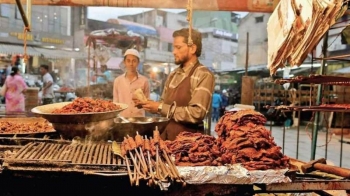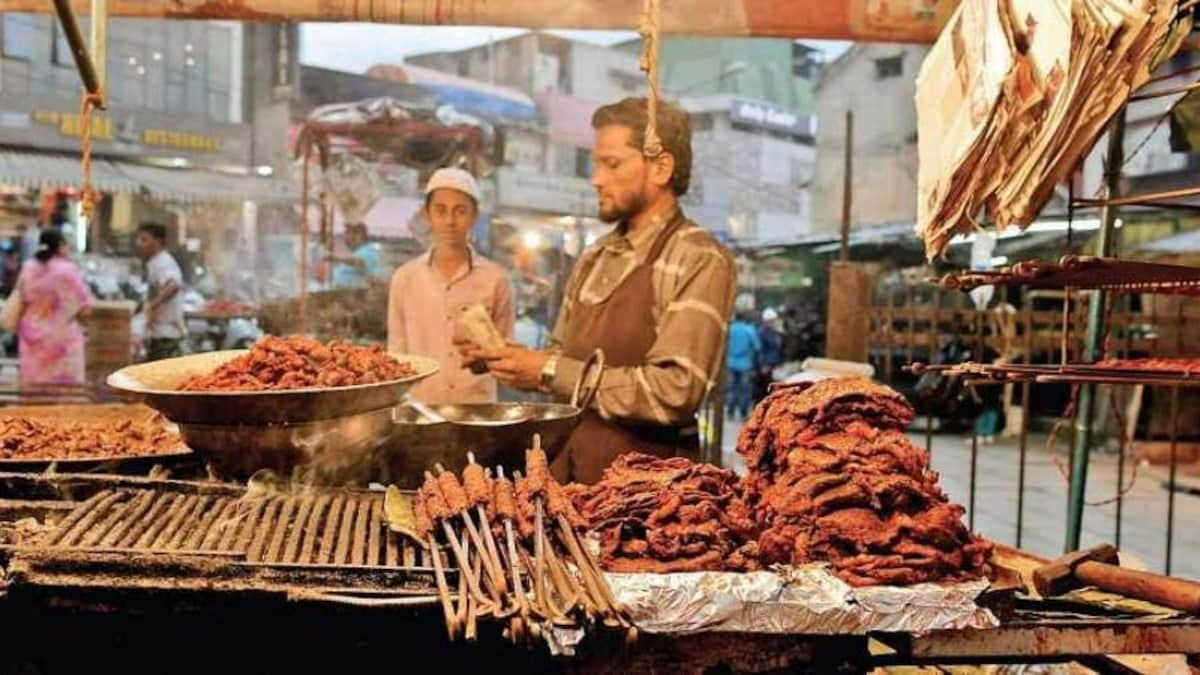
.png) Ram Puniyani
Ram Puniyani

The Town Planning Committee of the Ahmadabad Municipal Corporation recently ordered stalls selling non-vegetarian items would not be allowed along public roads and in the 100-meter radius of schools, colleges and religious places. On similar lines, decisions were also taken by Vadodara, Bhavnagar, Junagadh and Rajkot Municipal bodies. As the hawkers selling non-vegetarian items approached the Court, it struck down the decision by the authorities.
Surprisingly opposition to non-vegetarian food is part of the communal agenda. It is being propagated that non-vegetarian food causes violent tendencies. By now it has become a routine for one to hear at different occasions that Muslims are aggressive because they consume non-vegetarian food. When probed further, the consumption of beef by Muslims is also brought forward. Additionally, the point is made that since cow is holy for the Hindus, Muslims are hurting the sentiments of the former.
Two issues have been deliberately intertwined in the social common sense. One, non-vegetarian food causes violent tendencies and two, eating of beef by Muslims hurts the sentiments of Hindus. It is clear that the definition of non-vegetarian food varies from place to place and community to community. Eggs are permissible for some vegetarians and strict no for others. Some regard sea food, fish and the like as vegetarian while for others it is non-vegetarian food. Today world over roughly more than 80-90% of the population is non-vegetarian. As per a survey conducted by IndiaSpend, around 80 per cent of Indian men and 70 per cent of women consume meat weekly.
While Muslims in India are the object of wrath, Europeans, Americans etc. get away easily in this narrative despite having beef and other non-vegetarian food as their staple diet. In the countries and among people who follow the biggest apostle of non-violence ever, Lord Gautam Buddha, the consumption of non-vegetarian food is no less in quantum. In India too, there are innumerable communities for whom beef has been a part of the food habits. Different surveys show that eating non-vegetarian food is substantial in most communities in all states including Gujarat.
There are political undertones in this ‘hate non-vegetarian’ thinking. One can go to the extent of saying that vegetarianism is also being used as a social and political weapon to browbeat the minority community. No doubt, one has the choice of shifting to vegetarianism with full commitment, but to be intolerant to non-vegetarians and to label Muslims as having violent personality due to their food habits is a part of political campaign, bereft of any scientific-psychological rationale.
Historically speaking, beef and other non-vegetarian diet were common in Vedic times (Cow is essentially food, Atho Annam Via Gau, (cow is verily food)). Swami Vivekanand points out, “You will be astonished if I tell you that, according to old ceremonials, he is not a good Hindu who does not eat beef. On certain occasions, he must sacrifice a bull and eat it” (cited in ‘The Complete Works of Swami Vivekananda’, Vol 3 (Calcutta: Advaita Ashram, 1997, p. 536).
D. N. Jha in his book ‘Myth of Holy Cow’ shows that it was with the rise of agricultural society that the restriction was brought in on cow sacrifice by Lord Buddha. The primary goal was to preserve the cattle wealth. The ardent follower of Buddhism, Emperor Ashok, in one of his edicts to the royal kitchen orders that only as many animals and birds be killed as are necessary for the food in the kitchen. This was to put a brake on the animal sacrifice which was part of the Brahminical rituals. It was as a reaction to this that Brahminism came up to project cow as mother to show that it also has concern for cattle and in due course Brahmanism, and politics around it, gave her the status of mother.
As far as the violent personality and food are concerned, not much scientific literature is available to prove the co-relation of food with the violent tendencies. Violence is a personality trait, in the realm of psychology, which is shaped by familial, social and political circumstances, and keeps changing according to the situations.
There are systems of medicine, the traditional ones which classify food according to the Satwik (leading to pure, quiet persona), Tamsik (increasing anger) and Rajsik (royal) but it hasn’t been vindicated beyond empirical assertions. Despite some people holding on to human nature co-related to type of food, it is far from being vindicated by any of the modern scientific studies; on the other hand, there is an example of vegetarian Hitler unleashing the biggest ever genocide.
There are groups of people taking to vegetarianism and the latest vogue is that of veganism. The element of religiosity is not mixed up here. Neither should people be intolerant to the ones who consume non-vegetarian food. The phenomenon being observed among the sections influenced by communalism operates at the level of religiosity. Vegetarianism has become a part of one’s political agenda. As it is being mixed up with religion, it becomes associated with emotions and that’s where the rejection of non-vegetarians in the neighborhood comes in. Many housing societies refuse those who eat non-vegetarian food.
In Ahmadabad, I observed that landlord/ladies will barge into the kitchen of their tenants to ensure that strict vegetarianism is adhered to. Now amazingly this has been turned into one more tool to demonize Muslims. Overall, as seen in parts of Gujarat, vegetarianism is propagated and imposed in an aggressive way; the orders of Municipalities reflect that. One can certainly say that those propagating vegetarianism in such a fashion is intolerant to the hilt.